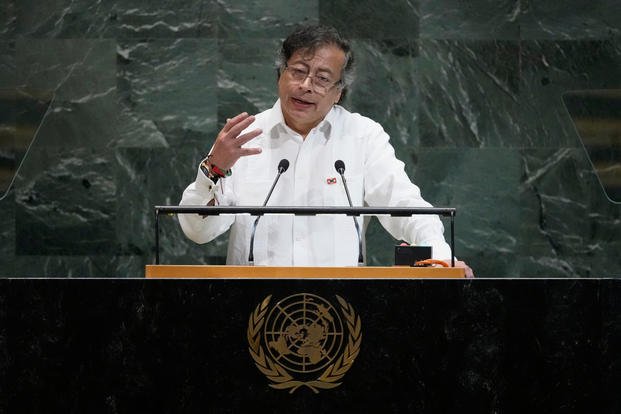WASHINGTON (AP) — Tensions between the United States and Colombia have escalated with the State Department announcing it was revoking a visa for Gustavo Petro, president of the Latin American country, after he participated in a New York protest where he called on American soldiers to disobey President Donald Trump’s orders.
The department said on social media that “we will revoke Petro’s visa due to his reckless and incendiary actions.”
Petro was visiting for the annual U.N. General Assembly. During a nearby protest Friday over the war in Gaza, he said “I ask all the soldiers of the United States’ army, don’t point your rifles against humanity” and “disobey the orders of Trump.”
Petro returned to Colombia on Saturday as intended, in accordance with a Sept. 18 decree on the delegation of powers during his absence. He said on X that he found out about his visa status upon his arrival.
The State Department did not answer questions about whether the revocation would affect future visits.
Petro, Colombia’s first leftist president, used a post on X addressed to Trump to say that “international law grants me immunity to go to the U.N. and that there should be no reprisals for my free opinion, because I am a free person.”
Petro, who has a history of speaking off the cuff in meandering, ideologically charged speeches, also said on social media that “I don’t care” about the punishment because he is also a European citizen. That means he does not need a visa to travel to the U.S.
Colombia broke diplomatic ties with Israel last year over the Israel-Hamas war. Petro has repeatedly described Israel’s siege of Gaza as genocide.
Colombia has long been a top U.S. ally in Latin America, cooperating closely on the fight against drug trafficking. But there have been repeated clashes between Petro, a former rebel group member, and Trump’s Republican administration.
In his General Assembly speech Tuesday, Petro called for a criminal investigation of Trump and other officials involved in this month’s deadly strikes on boats in the Caribbean that the White House has said were transporting drugs. The White House has offered scant information about how the operations came together or the legal authorities under which they were carried out.
Earlier this year, Petro resisted deportation flights using American military aircraft, leading to a diplomatic crisis as Trump threatened to retaliate with higher tariffs and visa suspensions. The U.S. is Colombia’s largest trading partner, and Petro’s government relented, saying it would accept the planes.
The U.S. accused Colombia earlier this month of failing to cooperate with anti-narcotics efforts. Although the designation did not include sanctions that would have slashed U.S. assistance to the country, it was a sharp rebuke that frustrated Petro.
He said his country had lost the lives of “policemen, soldiers and regular citizens, trying to stop cocaine” from reaching the United States.
___
Associated Press writer Regina Garcia Cano in Caracas, Venezuela, contributed to this report.
Story Continues
© Copyright 2025 Associated Press. All rights reserved. This material may not be published, broadcast, rewritten or redistributed.
Read the full article here


24 Comments
Revoking a visa seems like a disproportionate response. Was there no middle ground, like a formal diplomatic protest?
The U.S. might feel it’s sending a clear message, but it risks looking heavy-handed.
This incident highlights how quickly diplomatic relations can turn sour. Both sides need to tread carefully here.
I wonder if this will prompt other leftist leaders to think twice before criticizing U.S. policies in such a public manner.
It might, but it also risks pushing them further away from alignment with the U.S.
This could have broader implications for trade agreements and economic cooperation between the two nations. Investors should be cautious.
As an investor in Colombian energy projects, I’m watching this situation closely. Political turmoil can destabilize markets and investments.
Petro’s remarks about disobeying orders were indeed incendiary. However, it’s interesting to see how the US is responding to this, given the broader geopolitical context.
It’s a bold stance by the US, but it could further strain relations with Latin American nations.
True, but diplomatic immunity is a delicate matter. Revoking a visa over speech seems like a drastic move.
This escalation in tensions between the US and Colombia is concerning. It’s crucial for diplomatic channels to remain open, especially during volatile times.
This is a classic case of free speech vs. national security. Where do we draw the line when foreign leaders criticize our president?
It’s a fine balance. Diplomacy requires mutual respect, but interfering with a country’s military is a red line.
I’m surprised this didn’t get more media attention. U.S.-Latin America relations have been shaky for years, and this just adds to the tension.
Agreed. It’s a significant move, especially coming from the State Department.
As someone in the metals trading industry, I wonder how this diplomatic fallout might affect mining exports and imports between the two countries. Political instability often impacts commodity flows.
Good point. Colombia is a significant player in coal and emeralds, so sanctions or trade restrictions could have rippling effects.
I’m curious about the legal implications. If diplomatic immunity applies, can the U.S. really enforce this visa revocation?
It’s a gray area. The U.N. might have something to say about it if Petro was there in an official capacity.
Petro’s outspoken nature has always been controversial. This time, he might have overstepped.
Perhaps, but the U.S. could have handled this with subtlety to avoid further escalation.
As someone who follows U.S. foreign policy, I’m not surprised by this move. The Trump administration has been firm on perceived slights.
But is this really a slight, or just political rhetoric? The distinction matters.
At the end of the day, this is about respect for sovereignty. No country should interfere in another’s military affairs.